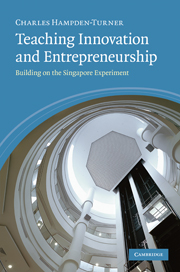Book contents
- Frontmatter
- Contents
- List of grids
- List of dilemmas
- Acknowledgements
- Introduction
- 1 Singapore’s challenge
- 2 The entrepreneurial ecosystem
- 3 How can innovative pedagogies be measured?
- 4 Co-defining innovative education
- 5 The Singapore results
- 6 Results of the Mandarin-speaking programme
- 7 Reconciling values
- 8 ‘It is only the Hawthorne Effect’
- 9 The programme that cannot stand still
- 10 Innovation and the future of the university
- 11 What are the implications of being able to teach innovation?
- 12 Is a new creative class arising?
- Notes
- Bibliography
- Appendices
- General index
- Index of dilemmas and reconciliations
10 - Innovation and the future of the university
Published online by Cambridge University Press: 05 July 2014
- Frontmatter
- Contents
- List of grids
- List of dilemmas
- Acknowledgements
- Introduction
- 1 Singapore’s challenge
- 2 The entrepreneurial ecosystem
- 3 How can innovative pedagogies be measured?
- 4 Co-defining innovative education
- 5 The Singapore results
- 6 Results of the Mandarin-speaking programme
- 7 Reconciling values
- 8 ‘It is only the Hawthorne Effect’
- 9 The programme that cannot stand still
- 10 Innovation and the future of the university
- 11 What are the implications of being able to teach innovation?
- 12 Is a new creative class arising?
- Notes
- Bibliography
- Appendices
- General index
- Index of dilemmas and reconciliations
Summary
At Harvard University a new campus is being built where a suburb of Boston, Allston, once stood. It stands next to the Harvard Business School on the Boston side of the Charles River. The plans for the campus, which will be as large as the whole of Caltech, have much to teach us about innovation and the future of the university. Assuming that these plans are fulfilled an extraordinarily bold vision of the university at the leading edge of an innovative economy will emerge. The Allston Campus will be inter-disciplinary and project- based. It will consist of cross-disciplinary alliances by two or more Harvard graduate schools who seek to make a novel synthesis between their fields of study. For example, research on the human genome will join forces with the School of Medicine to revolutionize medical diagnosis and treatment. Electronics is likely to join forces with mechanical engineering. Nano-technology will explore possibilities with chemistry and the life sciences. Up to this time seventy proposals for joint working have been received, but they have yet to be judged and the buildings housing them have still to be constructed.
There will be two graduate schools also present on this site, the School of Education and the School of Public Health, both inter-disciplinary by definition, and of course the Harvard Business School is close by. All three have the opportunity to learn from, to coordinate and to utilize what is being developed around them. If we regard Harvard’s Allston Campus as the potential shape of the future, which many other universities will come to imitate, then what does this signify? Are these plans consistent with the research findings in Chapters 5 and 6? I shall address these topics under the following headings:
(a) An innovative university requires major institutional changes through the creation of inter-disciplinary, problem-centred projects.
(b) Despite popular misconceptions you cannot ‘buy’ innovative achievements on the open market, not even by ever larger payments.
(c) The incubator of innovation is the often powerless, cash-strapped primary group of cross-disciplinary experts.
(d) Schools of business may not be the institutions best suited for promoting innovation.
(e) Innovators are the last minority to be fully emancipated.
- Type
- Chapter
- Information
- Teaching Innovation and EntrepreneurshipBuilding on the Singapore Experiment, pp. 152 - 164Publisher: Cambridge University PressPrint publication year: 2009



